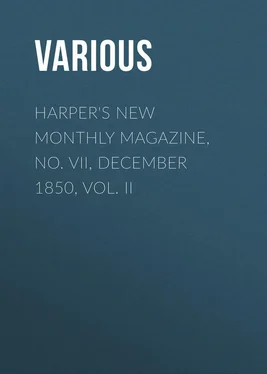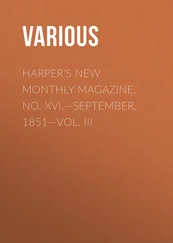Various - Harper's New Monthly Magazine, No. VII, December 1850, Vol. II
Здесь есть возможность читать онлайн «Various - Harper's New Monthly Magazine, No. VII, December 1850, Vol. II» — ознакомительный отрывок электронной книги совершенно бесплатно, а после прочтения отрывка купить полную версию. В некоторых случаях можно слушать аудио, скачать через торрент в формате fb2 и присутствует краткое содержание. Издательство: Иностранный паблик, Жанр: periodic, foreign_edu, на английском языке. Описание произведения, (предисловие) а так же отзывы посетителей доступны на портале библиотеки ЛибКат.
- Название:Harper's New Monthly Magazine, No. VII, December 1850, Vol. II
- Автор:
- Издательство:Иностранный паблик
- Жанр:
- Год:неизвестен
- ISBN:нет данных
- Рейтинг книги:4 / 5. Голосов: 1
-
Избранное:Добавить в избранное
- Отзывы:
-
Ваша оценка:
- 80
- 1
- 2
- 3
- 4
- 5
Harper's New Monthly Magazine, No. VII, December 1850, Vol. II: краткое содержание, описание и аннотация
Предлагаем к чтению аннотацию, описание, краткое содержание или предисловие (зависит от того, что написал сам автор книги «Harper's New Monthly Magazine, No. VII, December 1850, Vol. II»). Если вы не нашли необходимую информацию о книге — напишите в комментариях, мы постараемся отыскать её.
Harper's New Monthly Magazine, No. VII, December 1850, Vol. II — читать онлайн ознакомительный отрывок
Ниже представлен текст книги, разбитый по страницам. Система сохранения места последней прочитанной страницы, позволяет с удобством читать онлайн бесплатно книгу «Harper's New Monthly Magazine, No. VII, December 1850, Vol. II», без необходимости каждый раз заново искать на чём Вы остановились. Поставьте закладку, и сможете в любой момент перейти на страницу, на которой закончили чтение.
Интервал:
Закладка:
But wishing that they might "show his eyes" the mysterious operations in the little wooden house, however grievous it might be to his feelings, our anxious knight hurried round to the back, where, he took it for granted, there was some means of entrance, as he had seen no officer get in at the window. He was right. There was a small narrow door of planks, with a sentry standing before it, who wore a forbidding face of much importance. And now a gentleman in blue spectacles approached, and nodded to the sentinel, who tapped at the door. The door was unlocked, and the favored man of science entered. Through the closing door, Sir Valentine caught sight of a sort of long, shapeless table, covered with chemical instruments and utensils, in short, an apparatus exciting great curiosity. The door closed, just as Sir Valentine handed up his card to the sentinel. The door was opened again – his card given in; somebody took it, and it seemed to fly over a row of small white porcelain painters' pallets, standing mid-deep in water, and then disappeared, as the door was suddenly closed again. A voice within was heard to say, impatiently, "I really am afraid we can't be disturbed!"
"Can't you!" exclaimed Sir Valentine, addressing himself to a servant girl, with a child in her arms, who was trying to get a peep in at the door: "can't you, indeed! What treatment do you call this? Do you think gentlemen would take the trouble to come down here, such a distance, and up here such a height, if they did not expect to see all that could possibly be seen? Is this your duty to the public who pays you? Why should you conceal any thing from me? Am I not a person of sufficient wealth and respectability to be allowed to know of all your doings up here! What brings you here but the public service? Who is your master? tell me that!"
"Edward Smith, of Seaford," answered the girl, with an angry face; "but I don't know as it's any business of yours!"
Sir Valentine brushed past the girl with a "Pooh, pshaw!" Observing it was announced, by a placard on one side of the little wooden house, that the explosion would take place at three o'clock, he took out his watch and found that it was already half-past two. It became important to decide on the most advantageous place to take up a position, in order to have the best view of the grand explosion. Some of the visitors – in fact, a considerable number – had ascended to the very highest part of the rock, which swept upward, with its green coating of grass to a distance of a hundred and fifty or two hundred yards beyond the dangerous spot. Another crowd took their posts at about the same distance below the fatal spot, each crowd being widely scattered, the boldest in each being nearest, the most timid the furthest off. Another crowd – and this was the largest by far – had descended to the beach, to see, from below, the fall of the great mass of lofty rock. Many had taken boats, and rowed, or sailed out, to behold it from a more directly opposite, yet safer position.
Now, Sir Valentine Saltear, being an enthusiast in sight-seeing, had not the least doubt but the way really to enjoy the thing, would be to stand upon the portion of the cliff that was to be thrown down; and, leaping from crack to crack, and from mass to mass, as it majestically descended, reach by this means the sea, into which a good dive forward would render your escape from danger comparatively safe and easy. On second thoughts, however, he saw that it was precarious, because if the charge of powder were in excess of the weight to be separated, a great mass of fragments might fly upward into the air, and who could say but one of these might be the very place on which he himself was standing? He, therefore, contented himself with advancing to the extreme edge of the cliff, and peering over upon the beach below. The height was prodigious; the crowds walking about below were of pigmy size. The boats that were hovering about on the sea looked no bigger than mussel shells. Sir Valentine once thought of going out in a boat, but immediately recollecting that by doing so he should lose the fine effect of the trembling of the earth, he at once abandoned the idea. If he mounted above the scene of action he should lose the grandeur of the descent of the mass; if he stood on the mount at some distance below it, he could not see the surface crack and gape, though he might be exposed to flying fragments. He, therefore, decided forthwith on going down to the beach, and accordingly he hurried along the grassy slope, and then made his way down a precipitous zig-zag fissure in the sand hill below, till he found his feet rattling and limping over the stones of the beach.
Here he was amid six or seven thousand people – many more than he had seen from above – some walking about, some sitting in long rows or in groups, on the damp shingles, some standing in knots – all speculating as to how soon it would now be before the great explosion. A few flagstaffs were planted, with several sentinels, to mark the line which no one was allowed to pass; and this line was very strongly marked besides by a dark crowd of the most fearless of the visitors. According to their several degrees of apprehension, the crowds were scattered over the beach at various distances, some of them being at least a mile and a half off.
Sir Valentine, after an examination of all the bearings of the case, elected to have a place in the front row, close to the flagstaff; but, taking into consideration the possibility that the explosion might send up a great mass of fragments, which might come flying over that way, and crush numbers by their fall, he looked round to try and secure a retreat the instant he should see a black cloud of fragments in the air. The front line would not be able to retreat in time, because, being crowded, they would, in the panic of the moment, stumble over each other, and falling pell-mell, become an easy prey to the descending chalk. Sir Valentine, therefore, being not only an enthusiast, but also a man of foresight, took his post to the extreme right of the line, so that he could, if he saw need, retreat into the sea; to make sure of which, and, at the same time, to have an unimpeded view, he now stood half up to his knees in water.
It was three o'clock – the hour of doom for the chalk in its contest with gunpowder. A bugle sounded, and a movement of the sentries on the top of the rock was discerned by the thousands of eyes looking up from the beach. Many, also, who were above, suddenly thought they could better their positions by moving further off. Below, on the beach, there was a hush of voices; not a murmur was heard. Every body stood in his favorite attitude of expectation. All eyes were bent upon the lofty projecting cliff; and nearly every mouth was open, as if in momentary anticipation of being filled with an avalanche of chalk. Again a bugle sounded – and all was silence. Not a shingle moved.
Presently there was a low, subterranean murmur, accompanied by a trembling of the whole sea-beach – sea and all; no burst of explosion; but the stupendous cliff was seen to crack, heave outward, and separate in many places half way down; the upper part then bowed itself forward, and almost at the same instant, the cliff seemed to bend out and break at one-third of the way from the base, till, like an old giant falling upon his knees, down it sank, pitching at the same time head foremost upon the beach with a tremendous, dull, echoless roar. A dense cloud of white dust and smoke instantly rose, and obscured the whole from sight.
Every body kept his place a moment in silence – the front line then made a rush onward – then abruptly stopped, bringing up all those behind them with a jerk. Who knows but more cliff may be coming down? In the course of half a minute the cloud of dust had sufficiently dispersed itself to render the fallen mass visible. It formed a sort of double hill, about one-fifth of the height of the rocks above, the outer hill nearest the sea (which had been the head and shoulders of the fallen giant) being by far the largest. It was made up of fragments of all sizes, from small morsels, and lumps, up to huge blocks of chalk, many of which were two or three feet in thickness, intermixed with masses of the upper crust, having grass upon the upper surface.
Читать дальшеИнтервал:
Закладка:
Похожие книги на «Harper's New Monthly Magazine, No. VII, December 1850, Vol. II»
Представляем Вашему вниманию похожие книги на «Harper's New Monthly Magazine, No. VII, December 1850, Vol. II» списком для выбора. Мы отобрали схожую по названию и смыслу литературу в надежде предоставить читателям больше вариантов отыскать новые, интересные, ещё непрочитанные произведения.
Обсуждение, отзывы о книге «Harper's New Monthly Magazine, No. VII, December 1850, Vol. II» и просто собственные мнения читателей. Оставьте ваши комментарии, напишите, что Вы думаете о произведении, его смысле или главных героях. Укажите что конкретно понравилось, а что нет, и почему Вы так считаете.












